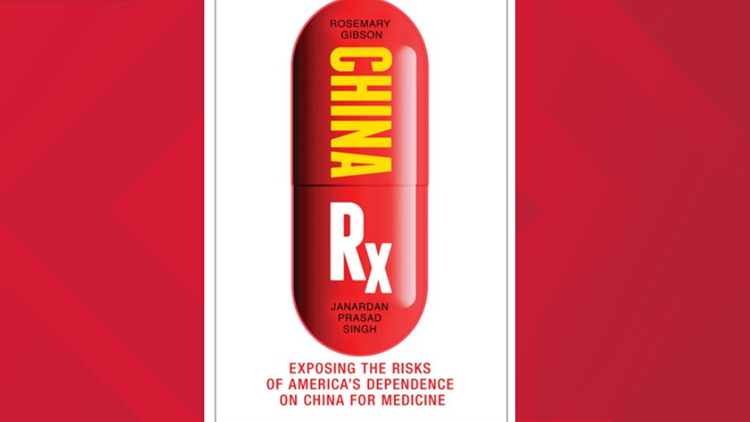CHARLOTTE, N.C. — Time is running out. Imagine Birth Control Pills, HIV, Alzheimer's Disease, Bipolar Disorder, High Blood Pressure, Colon Cancer, Chemotherapy, Anti-Depressants, Epilepsy, and 90% of antibiotics gone from pharmacies across the Carolinas, and the U.S.
"We should never have been in this situation."
Rosemary Gibson wrote the book on the subject, titled: China Rx: Exposing the Risks of America’s Dependence on China for Medicine. She predicts that the United States will see shortages of medicines by mid-March if conditions in China do not vastly improve.
"Beginning in March, if the Corona Virus continues to outbreak in China and workers are not going to work and transportation routes are still closed, shortages of vital medicines in the United States are likely to happen."
Gibson said China is already taking action to protect their own people first.
"We are already seeing that China is stopping companies that make masks, protective gear for Doctors, nurses, patients, the public, China is preventing companies from exporting them to other countries like the United States. They are basically nationalizing them. So if they are doing that for masks? Would it be surprising if they're nationalizing generic drugs used to treat patients with Coronavirus who are hospitalized to help them recover?"
Gibson said it was global trade, and less-expensive costs that have put patients at risk of shortages do to this epidemic. Gibson writes in her book the last penicillin plant in the United States closed in 2004.
"We're dependent on China for thousands of medicines because they make the core ingredients in those thousands of medicines, so that's number 1, and for the medicines that are used to treat people in the hospital-- China makes about 90% of the production for the medicines for people who might end of in the hospital for Coronavirus."
"Let's pray we don't have an outbreak in the United States."
We asked Gibson if the United States has the capacity to quickly produce all of the medicines a Hospital would need in the event of a severe outbreak of COVID-19 in a major U.S. city:
"No. All roads lead to China in the core ingredients, the chemicals, the molecules-- the real starting material to make our medicines. China's dominance is global. The Europeans are in the same situation, the Australians, Canadians, again I'm speaking mostly generic medicines which are 90% of the medicines we take."
According to the CDC and NBC News, the death toll has surpassed 2,000 people-- including the Wuhan hospital director. Chinese authorities stated that there are over 74,000 cases in mainland China. The novel coronavirus has been detected in 25 other countries including the U.S.
The World Health Organization has said that new data suggests COVID-19 is not as deadly as other coronaviruses and that more than 80 percent of victims develop only mild cases of the disease.
The official, Dr. Tedros Adhanom Ghebreyesus, told NBC News and other reporters in Geneva on Monday that China published a paper with detailed data on more than 44,000 confirmed cases of COVID-19, the disease caused by the novel coronavirus, that gives doctors and researchers a better understanding of the age range of people affected, the severity of the disease and the mortality rate.
The virus causes severe disease, including pneumonia and shortness of breath, in about 14 percent of cases, he added. About 5 percent of patients have critical diseases including respiratory failure, septic shock, and multiple-organ failure.
And the virus is fatal in 2 percent of reported cases, while the risk of death increases the older a patient is.
Rosemary Gibson is Senior Advisor at the Hastings Center and Perspectives Editor at JAMA Internal Medicine. She is the author of China Rx: Exposing the Risks of America’s Dependence on China for Medicine. It explores the dramatic shift in where the core ingredients and chemicals that go into medicines are made and the implications for U.S. hospitals and national security.
Ms. Gibson is the recipient of the highest honor from the American Medical Writers Association for her numerous contributions to the public’s interest in reporting on critical health care issues. China Rx was selected by the National Press Club for its 2018 book fair.
She serves as board chair of the Altarum Institute, a non-profit health systems research group in Ann Arbor. She is a member of the MedStar Institute for Quality and Patient Safety Advisory Board and the board of the Accreditation Council for Graduate Medical Education. She served on the ACGME CLER Evaluation Committee to improve patient safety and quality in teaching hospitals and other clinical environments. Ms. Gibson is faculty for the Academy for Emerging Leaders in Patient Safety which conducts summer immersion programs in patient safety for medical students, nursing students, and residents.
At the Robert Wood Johnson Foundation, Ms. Gibson built its decade-long national strategy to integrate palliative care into U.S. hospitals. The number of palliative care programs in acute care facilities increased from a handful in 1999 to 1,950 in 2018. She is the recipient of the Lifetime Achievement Award from the American Academy of Hospice and Palliative Medicine.
She has also written several other works covering different aspects of health care.
The CDC and NBC News contributed to this report.



